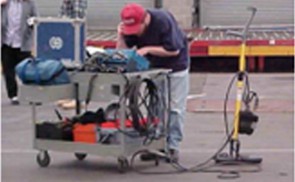Non-Destructive Testing
As the construction contractor, your contract calls for installing 100 caissons, 8 ft diameter by 125 ft long, and the acceptance criteria require proof that no flaws are present. As the design engineer for the rehabilitation of a 100-year old bridge with no existing plans, you must know the length and condition of the piles. As the attorney for the Owner of a tunnel in which the tunnel boring contractor has filed a claim for changed conditions, you need expert advice on the subsurface conditions where the tunnel boring machine failed. All of these real-life scenarios call for NDT, and each requires a different method. Of course, there are many different methods, and they all have in common the capability to test material without destroying it.
Why Hager-Richter?
Education, Experience, and Equipment. Most of our people have MS or Ph.D degrees in physics, geology, and/or geophysics. Hager-Richter has performed NDT for many projects, ranging from the determination of rock quality along 7000 ft of tunnel in hard rock to the thickness of a 90-year old bridge abutment.
Survey methods and applications include:
Seismic Methods |
|
General Applications:
|
Specific Applications:
|
Ground Penetrating Radar (GPR) |
|
General Applications:
|
Specific Applications:
|
Ultrasonics |
|
General Applications:
|
Specific Applications:
|
Pulse Echo Impact |
|
General Applications:
|
Specific Applications:
|
